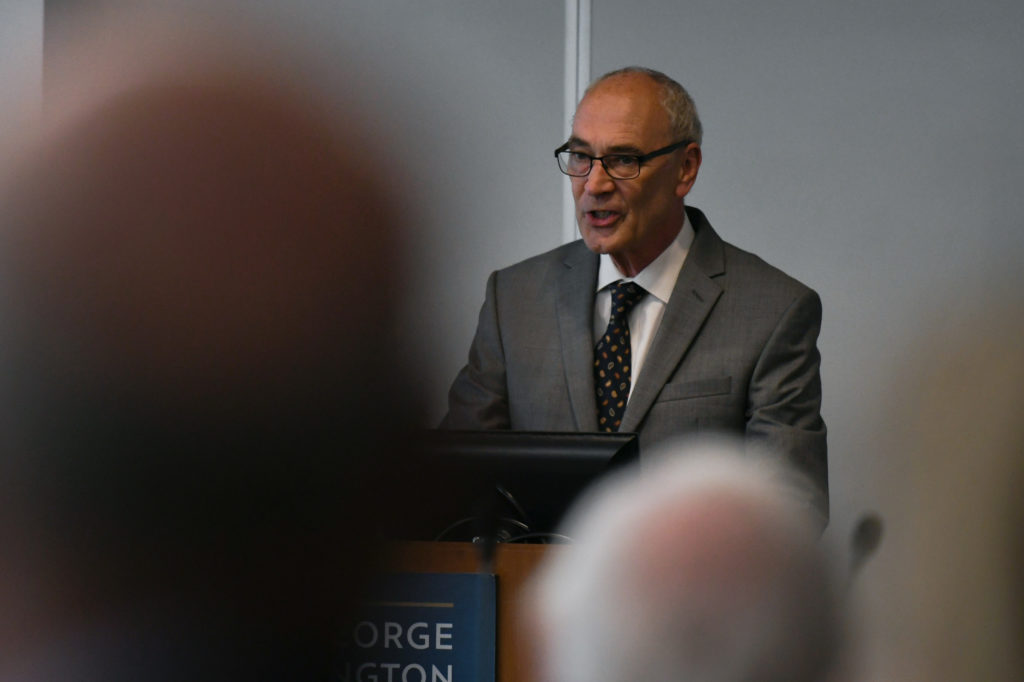Updated: Sept. 24, 2018 at 2:45 p.m.
The University began its largest faculty-led review of GW’s research enterprise this month.
Officials said faculty will split into seven working groups over the course of the academic year to examine nearly all facets of the University’s research practices, including research ethics, awards and non-sponsored research. The teams will produce a report of their findings in the spring – which officials said will help the University shape its research priorities and investments.
“I am pleased that our faculty are deeply engaged in the ecosystem review process,” Provost Forrest Maltzman said in an email. “This initiative is one in which faculty involvement is critical and will provide the university with the guidance we need to best support our research goals.”
The review officially commenced Sept. 14, when the first four working groups – comprised of roughly 50 staff and faculty in total – met for the first time, according to a University release. The four groups will explore the process leading up to applying for a research grant, the administrative work that follows receiving a grant, GW’s compliance with ethical research standards and how to support research with limited funding, the release states.
Officials first announced the review in April as a key goal of University President Thomas LeBlanc’s push to bolster GW’s research profile.
Robert Miller, the vice president for research, said the review is organized into two phases – one this fall and one next semester – because of the “large” amount of time faculty, staff and administrators must commit to the evaluation. Three additional working groups – focusing on topics like building computing infrastructure and postdoctoral hiring and recruiting – will form next semester, according to the strategic initiatives website.
“We hope the review will yield constructive input and feedback on pain points, areas that require improvement, things that are working well, benchmarking metrics, as well as any additional information that our faculty and research community wants to highlight,” Miller said.
Miller said the working group members were nominated by the Faculty Senate and represent “a diversity of schools, years of research experience, areas of research and familiarity with GW’s administrative processes.” He said the recommendations produced by each group will serve as “guideposts” for officials to improve research initiatives.
“All of the topics under review are critical to the success of GW’s research enterprise,” Miller said.
Kim Acquaviva, a professor of nursing who will head the research integrity and compliance group, said the group will evaluate topics like laboratory safety and the ethics of human and animal research.
“Without integrity, research isn’t research,” she said. “It’s junk with the potential to do real harm.”
She said the team will obtain a one-page research compliance report from the associate dean of research at each college in mid-October. The findings will then be shared with the school’s faculty for feedback, which the committee will share in their final report in the spring, she said.
“Whenever GW faculty and staff work together to identify opportunities for improvement in the way we do things, the University ultimately benefits,” Acquaviva said.
Jamie Cohen-Cole, an associate professor of American studies who will lead the non-sponsored research and scholarship working group, said his group focuses mostly on faculty who conduct research in the humanities. Non-sponsored research concerns inexpensive research endeavors, like researching and publishing a book, Cohen-Cole said.
He said the group will identify ways to prioritize research that isn’t often sponsored by hefty grants.
“A lot of GW’s infrastructure is set up to support sponsored research, and as a consequence, some of the research GW has done, that has historically been the strongest at the University, is essentially forgotten,” Cohen-Cole said. “It is easy to forget in research reviews about this stuff because it’s easy to mistake spending money on buildings or laboratories for doing research.”
Matthew Kay, a professor and associate chair for research and graduate affairs in the School of Engineering and Applied Science who will head the post-award process working group, said his group will examine the administrative tasks and spending that comes after a researcher has received a grant.
“It’s not a trivial task to set up an award, so it takes some time and there are some procedures that are involved in doing that to set things up properly so then the money can be spent according to federal policies and guidelines that are laid out by the funding agency,” he said.
He said the committee will work with faculty members who have research grants to discuss their experiences with the post-award research process and identify areas for improvement.
“I think that doing this is just an important part of an organization’s policy or goal of continual improvement, and I think that this is a very healthy initiative that the president has asked the faculty to do and there are going to be some good outcomes from this,” he added.
Melissa Perry, the chair of the pre-award process working group, did not respond to multiple requests for comment.
Shannon Mallard and Ilena Peng contributed reporting.
This post was updated to reflect the following correction:
The Hatchet incorrectly reported that the research compliance group will use the research deans’ reports to decide which subjects to focus on. The group will use the reports to garner feedback from faculty. We regret this error.





